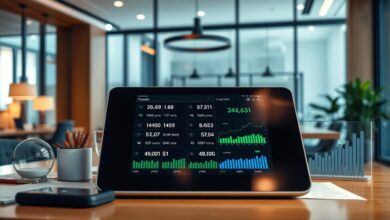Digital Accounts and Fees: What to Look For Before Choosing
In Nigeria, digital banking has changed the way people manage money. Over 50% of Nigerians now use digital banks because they are easy and affordable. Knowing what to look for in digital accounts can make banking better.
This article will cover key points like account types, fees, and security. It helps you find the best digital accounts for your needs. With the Central Bank of Nigeria watching and the Nigerian Deposit Insurance Corporation protecting you, picking the right digital bank is crucial.
Understanding Digital Banking in Nigeria
In recent years, understanding digital banking has become essential for Nigerian consumers. Traditional banking methods are changing. Now, managing finances online and through mobile apps is common. This means you don’t need to visit bank branches anymore.
What is Digital Banking?
So, what is digital banking? It’s about getting banking services online. In Nigeria, it has changed how people and businesses deal with banks. You can do things like send money, pay bills, and check your balance on your phone. This convenience is why more people are using it.
Benefits of Digital Banking
The benefits of digital banking are many. It makes banking more accessible, letting you manage your money anytime, anywhere. This is great for those living far from banks. Mobile banking apps and USSD codes also keep your information safe.
- Lower operational costs lead to competitive fees and charges.
- Real-time updates on transactions foster better financial management.
- A wider range of services compared to traditional banking, encompassing investments and savings options.
- Improved user experience through intuitive mobile applications and features like spending tracking.
As digital banking grows in Nigeria, knowing about it helps make better financial choices.
Types of Digital Account Options
It’s important to know about the different digital account options. Each one meets different financial needs and preferences. This makes it easier for people and businesses to manage their money well.
Checking Accounts
Checking accounts are great for everyday banking. They let you easily access money for daily needs. You can make payments and withdraw cash without paying interest.
In Nigeria, many people use these accounts for things like paying bills and buying things.
Savings Accounts
Savings accounts are very popular in Nigeria. They offer higher interest rates than checking accounts. This means your money can grow over time.
With savings accounts, you can save money and still have access to it when you need it.
Investment Accounts
Investment accounts help you grow your wealth. They let you invest in things like stocks, bonds, and mutual funds. These accounts come with tools to help you manage your investments better.
By using investment accounts, you can work towards your long-term financial goals.
Digital Accounts and Fees: What to Look For Before Choosing
When picking a digital bank, knowing about digital accounts and fees is key. The importance of low fees is huge. They greatly affect your banking experience. It’s important to watch out for different fees that can change how you manage your account.
Importance of Low Fees
Low fees make your digital bank more valuable. High fees can eat into your savings and make banking less effective. Fees for keeping your account open, transaction fees, and ATM fees should be low. This helps you keep more of your money.
Looking for low fees is crucial for saving money. It’s a key factor for anyone wanting to get the most out of their banking.
Types of Fees to Watch For
There are many fees to watch out for in digital banking. It’s smart to keep an eye on these:
- Monthly maintenance fees can range from $4 to $25, depending on the bank.
- Transaction fees can add up from different account activities.
- ATM fees can be around $2.50 for big banks and up to $4.77 for independent ATMs.
- Overdraft fees can be as high as $35 per transaction, adding up quickly.
- Insufficient funds fees are similar to overdraft fees, at about $35 each time.
- Wire transfer fees can be $16 to $35, for both domestic and international transfers.
- Early account closing fees can reach up to $25, if you close your account too soon.
Knowing about these fees helps you make better banking choices. You can find banks that fit your needs and save money on unnecessary fees.
Account Fees Comparison
It’s key to know about different account fees in digital banking. Comparing fees helps find the best value. Banks have their own rules for monthly, transaction, and ATM fees.
Monthly Maintenance Fees
Monthly fees differ among banks. Some don’t charge these fees, which is good for those watching their budget. Others might charge fees that add up, affecting your money. It’s important to look at these fees when comparing accounts.
Transaction Fees
Transaction fees can really add up, especially if you move money a lot. These fees change based on the bank and the type of transaction. Looking at these fees helps you manage your money better.
ATM Fees
ATM fees are something to watch out for. Banks might not charge for using ATMs in their network. But, using ATMs not in their network can cost you. Knowing about ATM fees helps you avoid extra charges when getting cash.
Best Digital Accounts Available
Finding the best digital accounts in Nigeria means looking at what top digital banks offer. Digital banking keeps changing, meeting different financial needs. People want to know about features, interest rates, and experiences to make smart choices.
Top Digital Banks in Nigeria
In Nigeria, many digital banks stand out, each with its own benefits. They offer various options to meet different customer needs, such as:
- Competitive interest rates ranging from 0.10% to 3.30%
- No monthly maintenance fees or minimal charges
- Access to extensive ATM networks with over 55,000 fee-free locations
- Innovative features like cashback rewards and fee reimbursements
Comparing Features and Offers
When comparing digital accounts, it’s important to look at a few key things. Customers should check:
- Ratings and reviews, which may range from 4.5/5 to 5.0/5
- Fees, which can vary significantly, with some accounts charging anywhere from $0 to $300 annually
- Specific perks such as in-credit interest on balances or international money transfer capabilities
By carefully looking at these points, people can find the digital bank that fits their financial goals and needs.
High Yield on Savings Accounts
More people are choosing high yield savings accounts to grow their savings. Traditional savings accounts only offer about 0.46% interest. But, high yield accounts can give much better returns, making a big difference in your savings.
Why Choose Higher Yield Accounts?
High yield savings accounts have many benefits. They often have APYs over 4%, with some banks offering rates above 5%. Online banks and credit unions usually have the best rates because they have lower costs. This means they can give more money back to their customers.
Comparing Interest Rates
When picking a high yield savings account, it’s key to compare interest rates. Rates can change for many reasons, like what the Federal Reserve does. Some accounts offer yields like:
- Pibank: 5.50%
- Newtek Bank: 5.25%
- TIMBR: 5.25%
- BrioDirect: 5.05%
- EverBank (FL): 5.05%
- Ivy Bank: 5.30%
- Laurel Road: 5.00%
By looking at APYs from different places, you can choose the best one for your money goals. Remember, these rates can change. So, always check to make sure you’re getting the best deal.
Security Features to Consider
Digital banking security is key for keeping your money safe. It’s important to know about the different security measures. These include CBN licensing and NDIC deposit insurance, which help protect your finances.
Importance of CBN Licensing
CBN licensing is very important. Licensed banks follow strict rules to prevent fraud and protect customers. Choosing a bank with a valid CBN license reduces risks from unregulated banks.
This license is a key part of security. It shows that the bank follows national financial standards.
NDIC Deposit Insurance
NDIC deposit insurance is a vital safety net. It protects your money if the bank fails. This insurance gives you peace of mind for your savings or checking accounts.
Knowing your deposits are insured boosts your confidence in your bank. CBN licensing and NDIC deposit insurance together show a bank’s trustworthiness. They help keep your money safe and build trust with customers.
Choosing the Right Account for Your Needs
In today’s digital banking world, picking the right account is key. It’s important to think about what you need from a bank. Look at how often you use your account and if you need to withdraw cash.
Also, consider if you want to earn interest on your money. This can help you choose the best account for your goals.
Assessing Your Banking Requirements
Before you decide, understand your financial habits and goals. Ask yourself a few questions:
- How often will I make transactions each month?
- Do I require access to physical cash regularly?
- Is earning interest on my deposits important?
- What specific features do I value in a digital account?
These questions can help you pick the right account. Think about fees, balance requirements, and transaction limits.
Looking for Additional Features
Many digital banks offer extra features that are appealing. You might find useful tools like:
- Budget tracking tools that help manage finances efficiently.
- Financial advice and planning services.
- Investment opportunities directly linked to banking accounts.
These features can make managing your money easier and help you reach your financial goals. So, when choosing an account, consider both basic needs and extra features.
Conclusion
Exploring digital accounts and fees can seem daunting at first. But, with a careful approach, finding the right financial solutions in Nigeria is possible. There are many options, from checking and savings accounts to investment ones. Each offers unique benefits of digital banking.
When picking a digital account, it’s key to balance low fees with security. Knowing about monthly fees, transaction costs, and ATM fees helps. This knowledge helps choose the most beneficial accounts.
Smart banking decisions lead to better savings and a smoother banking experience. They also help with long-term financial health. Understanding digital accounts and fees well prepares individuals for managing their finances effectively.
FAQ
What is digital banking?
What types of digital accounts are available?
Why are low fees important when choosing a digital account?
What kinds of fees should I watch for with digital banking?
How can I compare account fees among different digital banks?
What features should I look for in the best digital accounts?
What are higher yield savings accounts?
How important is security when selecting a digital bank?
How do I assess my banking requirements before choosing a digital account?
What additional features can digital banks offer?
Published on: 2 de August de 2024

Abiade Martin
Abiade Martin, author of WallStreetBusiness.blog, is a mathematics graduate with a specialization in financial markets. Known for his love of pets and his passion for sharing knowledge, Abiade created the site to provide valuable insights into the complexities of the financial world. His approachable style and dedication to helping others make informed financial decisions make his work accessible to all, whether they're new to finance or seasoned investors.






